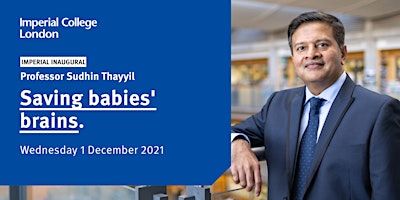You must login before you can post a comment.
Saving Babies’ Brains
Science & Technology
The lecture is free to attend and open to all, but registration is required in advance.
Please note that in-person seating is offered on a first come first served basis. It is mandatory to register for a ticket if you would like to attend this event in-person. Unfortunately, we are unable to permit entry to those without a ticket on the evening.
If the main lecture theatre reaches capacity you will only be able to register for a virtual event ticket.
Please note that all children must be accompanied by an adult.
Abstract
The relationship between birth asphyxia and neonatal brain injury was first described more than 150 years ago and the complications it creates continues to be a leading cause of death and disability amongst infants born at full term. In fact, over 4 million babies being affected each year worldwide.
And yet prevention and treatment of this condition remains elusive. In the UK, obstetric litigation costs relating to birth asphyxia related brain injuries extend into billions, although a cause-and-effect relation are far from clear.
Sudhin Thayyil is Professor of Perinatal Neuroscience at Imperial College London who studies babies with birth related brain injury. His group explores the changes in expression of the genes of the babies to understand what causes birth related brain injury and use advanced magnetic resonance biomarkers to develop new treatments for brain injury. In his inaugural lecture he will discuss his journey as a clinical academic neonatologist in the UK, and how this work might help in preventing brain injury and in providing personalised neuroprotective therapies in future.
Biography
Professor Sudhin Thayyil qualified (MBBS) from Calicut Medical College, Kerala, and completed a 3-year paediatric residency (MD) at All India Institute of Medical Sciences, New Delhi, before coming to the UK. He undertook core paediatric training in Leicester and Newcastle, Neonatal grid training in Cambridge-London rotation (2005 to 2008) and PhD at University College London (2007 to 2010) under the supervision of Professor Andrew Taylor. He was appointed as a Senior Clinical Lecturer and Honorary Consultant Neonatologist at University College London in 2011. In 2014, he joined Imperial College London as a Reader and was promoted as a Professor of Perinatal Neuroscience in 2020. He was awarded an NIHR Clinician Scientist fellowship in 2011, and an NIHR advanced fellowship in 2018, and his total grant income and principal and co-investigator exceeds £15 million.
He has conducted some of the largest studies in the world on post-mortem magnetic resonance imaging, magnetic resonance biomarkers in neonatal encephalopathy and on evaluation of hypothermia treatment in low and middle-income countries. He is an international authority on neonatal encephalopathy and is the director of Centre for Perinatal Neuroscience at Imperial College London. His group was first in the world to describe the specific gene expression changes in neonatal encephalopathy that has the potential for a rapid diagnostic test to reveal the underlying cause and timing of the fetal brain injury. He currently leads a team of over 70 researchers in the UK and India and has published extensively including several papers in the Lancet.
He is passionate about supporting and mentoring early career researchers, particularly those from disadvantaged backgrounds, and his team members have been awarded over 10 prestigious fellowships in the past five years.
COVID-19 guidance
This event is being planned in-line with anticipated Government guidance at the time of the event. All College safety policies in place at the time will be followed. You can read about our current safety policies on the College website.
We are committed to delivering our events safely and responsibly and in order to do so, elements of the event may need to change to adhere to any updated Government or College guidance.
This may include the use of face coverings, a reduction in guests at the in-person event and some adjustments to the schedule of the evening. We will keep guests fully up to date with any changes and further details about our plans as we move towards the event.
We also request that if you test positive for COVID within 14 days after the event please do let us know as soon as possible so that we are able to notify other attendees for contact tracing purposes.
--
Please note that Imperial College London processes your personal data in line with the Advancement Privacy Notice. If you have any questions or concerns about this please contact [email protected]




